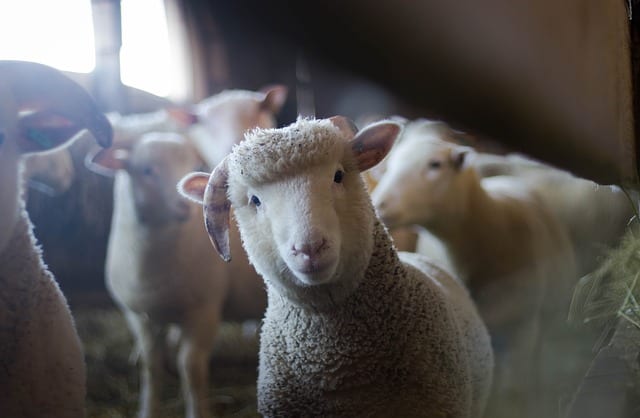The origin of this custom is in Judaism; later it was adopted by Islam. Kurban is referred to in both Old Testament and the New Testament. Yet, the Christians and the Jews do not sacrifice animal. Even though this custom did not originate in Islam only the Muslims perpetuate this barbaric ritual of slaughtering animals. And why?
By: Ayhan Ozer

According to the Islamic Tradition, in this lunar month of Zulhijja the Muslim world performs the Hajj, the pilgrimage to Mecca. In Islam the Hajj is one of the five pillars of Islam. At the end of the Hajj the devout perform a ritual by sacrificing an animal, usually a sheep or a ram which is called “Kurban”. In English this religious offering is called sacrifice or oblation; it commemorates the Prophet Ibrahim’s readiness to sacrifice his son Ismail (from his wife Hager) at God’s request. Through this action Ibrahim demonstrated an unflinching faith, and unswerving obedience to God. However, the Judaic Tradition gives a different account for this event. It claims that the son of Ibrahim was Isaac (from his wife Sara), not Ismail. Hager was a hand-maid (a servant or an attendant of Sara). Whichever is true is a matter of interpretation. The Muslims re-enact that sacrifice as a commemoration of Ibrahim’s example of belief and submission to God’s will. The four days Feast that follows marks the culmination of the pilgrimage.
“Kurban” literally means “approaching”, “approximation”. In a religious context it implies coming closer to the Divine through faith and piety. Etymologically, the word of “Kurban” is related to Korban, a Hebrew word, which also means “to approach”.
The origin of this custom is in Judaism; later it was adopted by Islam. Kurban is referred to in both Old Testament and the New Testament. Yet, the Christians and the Jews do not sacrifice animal. Even though this custom did not originate in Islam only the Muslims perpetuate this barbaric ritual of slaughtering animals. And why?
First, wisely, the Christians and the Jews realized that this archaic custom handed down from the time immemorial was wasteful and primitive, and there was no place in their lives for such an extravagant and anachronistic ritual any more. This is the economical and practical aspect. There is also a religious aspect. In the Roman times, the Jews practiced sacrificial ceremonies around Passover in their Temple located at the Moriah Mountain. In A.D. 70, this Temple was destroyed by the Roman Emperor Vespasian. This practice was interrupted until the re-building of the Temple. As the Temple was never re-built this custom lost it zeal and abandoned.
As for the Christian Traditions, in the New Testament Jesus Christ is regarded as the “Lamb of God” who was “sacrificed” for the redemption of his followers. Therefore, no new sacrifice was needed. The Christians replaced this custom with bread and wine symbolizing the body and blood of Christ. Thus, only the Muslims doggedly follow this practice which is not even a teaching of Islam. Furthermore, it is a pervert notion to believe that one gets closer to God by blood-shed, by sacrificing animals! As this custom predates Muhammed, it does not carry an Islamic injunction (Farz) either.
For the Muslims living in the Western world observing the Feast of Sacrifice poses certain challenges. First of all the ritual involved is very graphic; therefore it is offensive, and alien to western sentiment and culture. It also must follow strict health codes, which makes it burdensome. In some communities the Muslim congregations make arrangements with farms or slaughter houses (abattoirs) for their ritual sacrifices to be performed out of sight and in compliance with the health regulations.
A few years back, in a mid-size German town a Muslim family was caught in a bizarre controversy. The family members were celebrating the Feast of Sacrifice in their own way. They were gathered in the balcony of their apartment, including children. A sheep was being slaughtered in full view by a man wearing a white apron, and wielding a butcher knife. Blood splattered around. The scene was graphic and hair-raising. The neighbors were outraged. This caused an uproar. The TV camera focused on this ghastly scene depicting it as an Islamic sacrificial ritual. Several complaints were filed. The Mayor of the city came on TV, and condemned this “barbaric” practice. He accused the family of violating the law and being insensitive to their neighbors’ feelings, and furthermore for being inconsiderate of the customs and the norms of the country.
Some benevolent aspects of the religious rituals may be tolerated by the followers of other religious traditions as well. The people can relate to the observances in other religions, and view them as festive celebrations in a community spirit. Those rituals are also venerated as solemn remembrance and a renewed commitment to a Deity. All those observances are by and large common in all faiths; however, such parochial customs should be practiced in strict privacy, and the respect to other peoples’ feelings and sensitivities must be paramount.
******


Leave a Reply